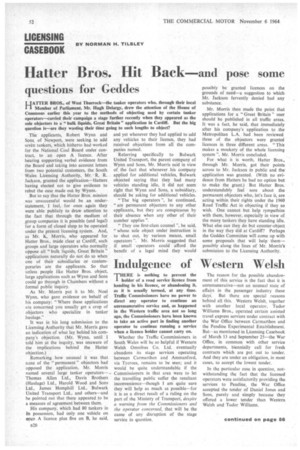Indulgence of Western Welsh
Page 54

If you've noticed an error in this article please click here to report it so we can fix it.
TERE is nothing to prevent the holder of a road service licence from handing in his licence, or abandoning it, as it is usually termed, at any time. Traffic Commissioners have no power to direct any operator to continue an unremunerative service and, as happened in the Western traffic area not so long ago, the Commissioners have been known to take an active part in finding another operator to continue running a service when a licence holder cannot carry on.
Whether the Traffic Commissioners in South Wales will be so helpful if Western Welsh Omnibus Co. Ltd. eventually abandons its stage services operating between Carmarthen and Ammanford, via Tycroes, remains to be seen; and it would be quite understandable if the Commissioners in that area were to let the travelling public suffer the resultant inconvenience—though I am quite sure they will help as much as possible—for it is as a direct result of a ruling on the part of the Ministry of Transport, despite a warning from the Commissioners and the operator concerned, that will be the cause of any disruption of the stage service in question.
The reason for the possible abandonment of this service is the fact that it is unremunerative—not an unusual state of affairs in the passenger industry these days. But there are special reasons behind all this. Western Welsh, together with another local operator, Tudor Williams Bros., operated certain assisted travel express services under contract with the War Office between Carmarthen and the Pendine Experimental Establishment. But—as mentioned in Licensing Casebook of March 13 and September 25—the War Office, in common with other service departments, biennially call for fresh contracts which are put out to tender. And they are under an obligation, in most cases, to accept the lowest tender.
In the particular case in question, notwithstanding the fact that the licensed operators were satisfactorily providing the services to Pendine, the War Office accepted the tender of Daniel Jones and Sons, purely and simply because they offered a lower tender than Western Welsh and Tudor Williams.












































































































































































